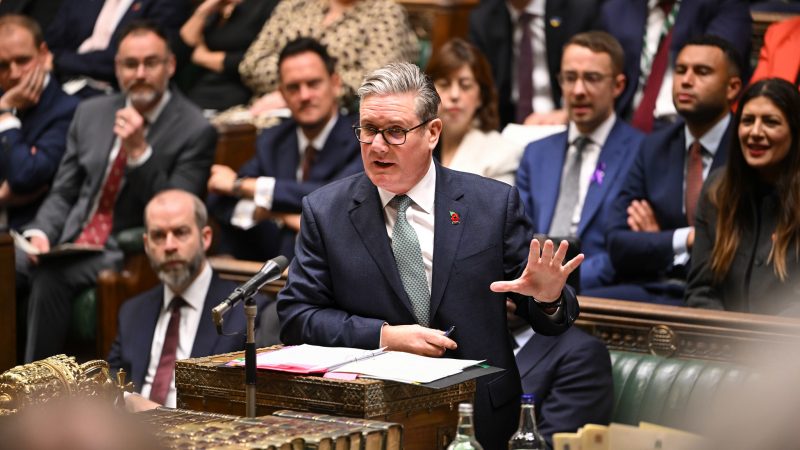
Speculation is rife, not least from sources inside Downing Street, that Prime Minister Keir Starmer could face a challenge for the Labour Party leadership should the Budget fall flat or if the party suffers catastrophic defeat at May’s devolved and local elections.
Should such a contest come sooner rather than later, it would be the second election for a leadership role in the party in less than a year, following the election of Lucy Powell as deputy leader last month.
Since the party first started holding leadership elections in 1922, three sitting party leaders have been challenged on four occasions – Hugh Gaitskell in 1960 and 1961, Neil Kinnock in 1988 and most recently Jeremy Corbyn in 2016.
However, no sitting Labour Prime Minister has ever faced a leadership election. The only contest to take place while in government was in 1976, triggered by the resignation of Harold Wilson.
So if a challenge were to be made against Keir Starmer, what would the rules for a leadership election be, and what is the mechanism for triggering one?
What potential nominees need to get on the ballot
According to the party rulebook, in the event that there is no vacancy for the leadership (Starmer has signalled he would fight any contest made against him), potential challengers can seek nominations from members of the Parliamentary Labour Party.
Their nomination must reach a threshold of 20 percent of the PLP – meaning any challenger would currently need the backing of 81 Labour MPs, as the party currently has 405 MPs (although this number could change if any have the whip withdrawn). Nominees must be Commons members of the PLP, which would rule out potential challengers like Andy Burnham.
Crucially, the current leader would not be required to seek nominations in the event of a challenge.
Two weeks before the start of the election process begins, nominees would need to inform party general secretary Hollie Ridley of their acceptance (or otherwise) of their nomination. Written consent is required – otherwise their nomination is deemed null and void.
Nominees would then need to seek support from five percent of constituency parties or backing from at least three affiliates comprising five percent of affiliated party membership (at least two of those affiliates would be required to be trade unions).
READ MORE: Wes Streeting denies Number 10 accusations of leadership plotting
Rules for the election itself
Ridley would act as the returning officer for the contest and would appoint a party legal advisor to act as deputy to advise on matters of dispute. She would also appoint an independent scrutineer to oversee and verify the ballot – as well as to agree the timetable of the election.
While precise eligibility criteria for the contest would be defined by the NEC, the rulebook states that potential voters would need to have been a party member for at least six months prior to the approved timetable being announced.
Each candidate, including the incumbent, would be allowed equal access to the eligible electorate, as well as equal access in all other matters pertaining to the election. In practice, this is likely to mean access to contact party members via mail, text, email and other forms of communication – similar to what members received during the deputy leadership election.
The rulebook does not set out a set number of days voting in the election must last. However, the 2020 leadership election saw members able to cast their ballot over 38 days, with the 2016 contest lasting 33 days.
The rulebook states that the results of the contest would be declared at a session of party conference. At times when contests have taken place too far away from the party’s national conference, a special conference has taken place to announce the result.
Subscribe here to our daily newsletter roundup of Labour news, analysis and comment– and follow us on Bluesky, WhatsApp, X and Facebook.
Share your thoughts. Contribute on this story or tell your own by writing to our Editor. The best letters every week will be published on the site. Find out how to get your letter published.
-
- SHARE: If you have anything to share that we should be looking into or publishing about this story – or any other topic involving Labour– contact us (strictly anonymously if you wish) at [email protected].
- SUBSCRIBE: Sign up to LabourList’s morning email here for the best briefing on everything Labour, every weekday morning.
- DONATE: If you value our work, please chip in a few pounds a week and become one of our supporters, helping sustain and expand our coverage.
- PARTNER: If you or your organisation might be interested in partnering with us on sponsored events or projects, email [email protected].
- ADVERTISE: If your organisation would like to advertise or run sponsored pieces on LabourList‘s daily newsletter or website, contact our exclusive ad partners Total Politics at [email protected].




More from LabourList
Almost half of Labour members oppose plans to restrict jury trials, poll finds
‘How Labour can finally fix Britain’s 5G problem’
‘The University of the Air – celebrating 60 years of Harold Wilson and Jennie Lee’s vision’